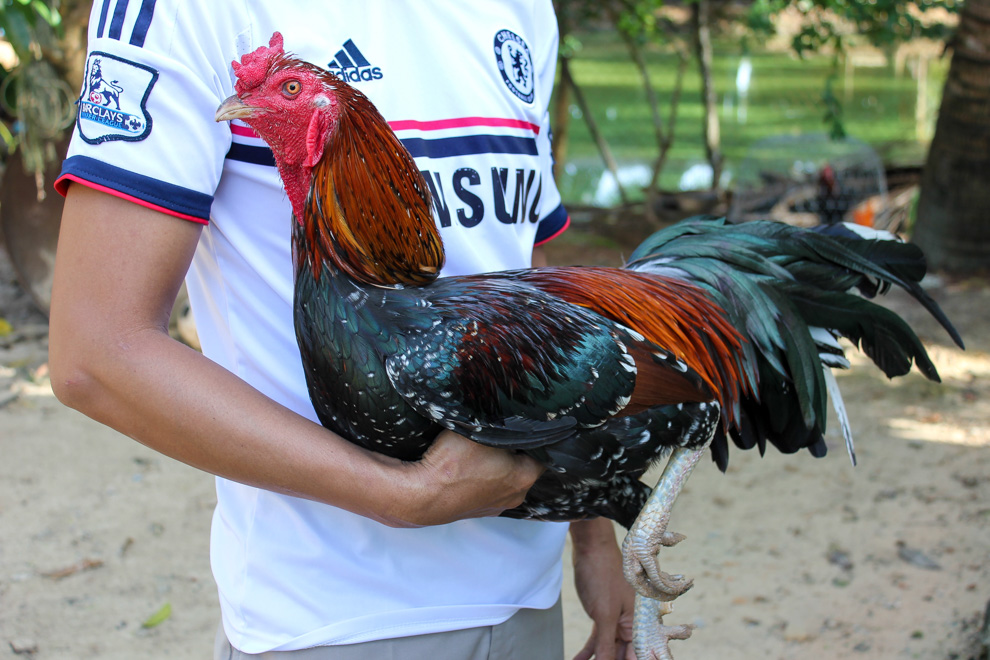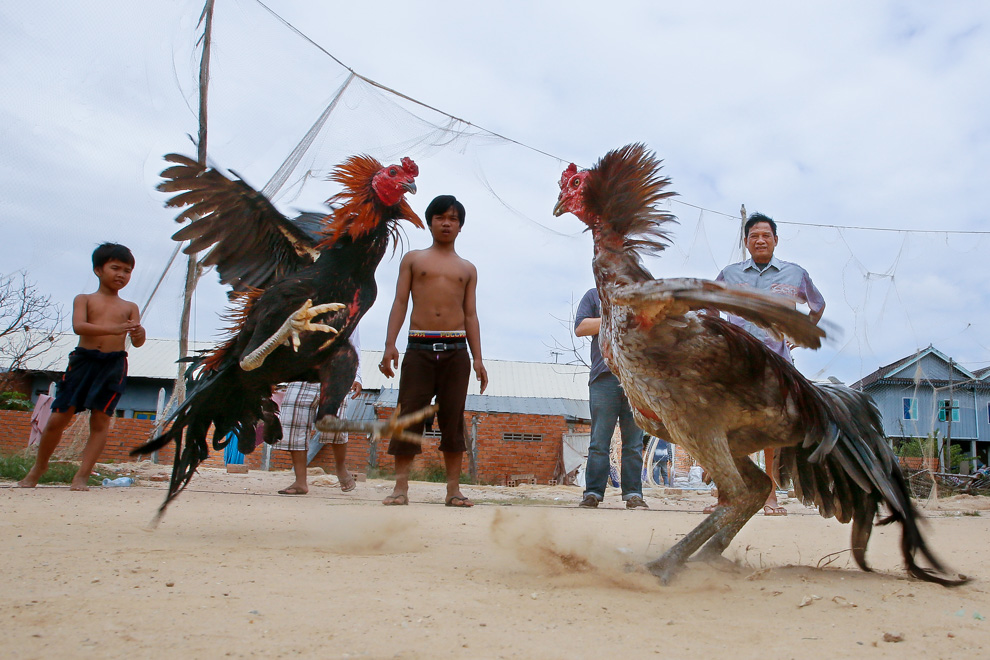
A resident of Koh Kong’s Dang Tong commune holds one of his fighting cocks under his arm on Monday.
After nearly 10 minutes of pitched battle, both fighting cocks were clearly worn down.
The handlers brought the birds back to the middle of the caged ring during a fight earlier this year on the grounds of CPP Senator Ly Yong Phat’s now largely deserted Safari Park.
A piece of clear plastic, placed between the birds so they could stare-off and muster some aggression, was spattered with blood, which spewed from the metal-spur-inflicted wounds.
A crowd of about 100 people – mostly middle-aged men, but including some women and children – began to shout as the fight was restarted once again, the roar rising with every strike.
“I think I’m going to lose,” said tuk-tuk driver Vanna, who bet $5 on the “blue” contender (identified by a coloured tag around his ankle), which was considered an underdog given that his “red” opponent was a few hundred grams heavier.
But, he added, “The bigger birds don’t always win. It’s difficult to tell.”
Though Prime Minister Hun Sen proclaimed cockfighting illegal in 2009, like many rules in the Kingdom, there are exceptions.
Business tycoon and ruling party Senator Yong Phat is one of those.
In September 2015, his border casinos in Koh Kong and Oddar Meanchey provinces received licences to run legal cockfights, a sport condemned as cruel and inhumane in much of the globe.
In Koh Kong, fights run on weekends and bird owners usually bet upwards of $250, though sometimes thousands, according to interviews with attendees during two fights this year.
Though it’s technically legal, the atmosphere remains secretive. Few of the spectators or participants wanted to speak or give their names.
Photos are forbidden, and ushers keep watch for any phones that may be used to record the mortal combat.
Vanna, the tuk-tuk driver, who said he only comes at customers’ request, speculated as to why.
“It’s because of the gambling,” he says, soon after his chosen bird went limp and “red” was declared the winner.
Though Cambodians are ostensibly prohibited from gambling by law, the metal-roofed, open-sided cockfighting den at Koh Kong’s Safari World appears a small, dusty haven.
Nearby, sticking out of the green tree line, is the gleaming blue cupola of Yong Phat’s faux neo-classical casino, where gamblers, many from nearby Thailand, enjoy air-conditioned luxury.
But surrounded by plastic furniture, wandering dogs and the ceaseless crowing of caged cocks, the cockfighting arena’s atmosphere is a bit more rowdy. Punters hustle at a Yuki table – a Chinese gambling game – or shoot billiards. Vendors work the crowd with bottled water, energy drinks, boiled eggs and fruit.
Last Saturday, more than 100 people filled the three-tiered concrete bleachers surrounding the earthen ring to watch about 10 fights.
Before each match, bookies circled the arena, calling out for bets as spectators shout odds, which change throughout the match as blows land.
Trainers delicately prepared their gamecocks for the brutal clash, carefully taping steel spurs to each ankle, swigging water and spraying a mist over the feathers, and softly patting their champions.
“Because it’s illegal in the villages, people bring their cocks here, and if they meet the criteria, the weight, they can fight,” said one of the organisers, adding that people came from as far away as Phnom Penh and Preah Sihanouk to compete.
The organiser, who declined to be named, said the minimum stakes were about $62 for the cock’s owners, though the usual bet for locals was about $250.
Out of the fighters’ bet – which the loser agrees to pay the winner – the company takes a “service fee” of just over 10 percent.
For bets higher than $500, he said, the owners usually make an informal agreement between themselves and do not involve the company, adding that wagers could reach $2,000 or more.
The crowd, too, gets in on the action. Bookies wearing polo shirts emblazoned with “VHH” – the name of the firm that runs the arena, and which the organiser said was a Ly Yong Phat business – facilitate bets between members of the crowd, taking a cut for themselves and another for VHH.
Once a bet on a blue ticket is written up, a bookie will search the stands for someone to take the red ticket and its stakes. “If you win 200,000 riel then you have to give [the bookie] 5,000 riel, and then from that he’ll pay the company 2,500 riel,” the organiser said.
Sitting on the top tier as a new match got underway on Saturday, two friends, one calling himself Deang, smoked cigarettes and surveyed the competitors.
As the handlers thrust the cocks towards one another to set the birds off, Deang shouted: “100,000 riel on red.”
About three minutes of fighting later, the red bird was routed, having jumped out of the ring for a second time – a clear loss.
Nearby Ath, who also declined to give her full name, said she was not particularly interested in the fights but had come to watch with her husband, who wasn’t having a good day.
“He won one but lost four,” she said, estimating they were about $112 down and adding that his refusal to take her advice had contributed to his losing streak.
“I told him to bet on the blue but he listened to others and bet on the red, which lost.”
Reached yesterday, Phat Bun Hour, deputy general director of the Ly Yong Phat Company, reiterated that the Koh Kong arena was licensed. Asked more specifically as to whether the licence covered gambling by Cambodians, he referred questions to authorities.
Though it’s widely understood that Cambodians are forbidden from gambling in the Kingdom’s casinos – and elsewhere – the nation’s law on gambling makes no specific mention of bettors’ nationality.

People watch as two cocks engage in a fight at a village in Kampong Speu province in 2014. Heng Chivoan
Officials from the Ministry of Finance could not be reached to clarify Cambodia’s regulations on citizens’ gambling, and while government spokesman Phay Siphan yesterday said he understood gambling to be illegal for all Cambodians, he was unaware of a specific sub-decree.
Cambodia National Rescue Party lawmaker Son Chhay, an anti-graft campaigner, said that Yong Phat’s exclusive rights to legal cockfighting suggested at least the possibility of corruption.
“What sort of things has he done to get this special privilege that other people are not allowed to have? Who did he pay and how much for the licence? These are the questions which should be asked,” Chhay said.
As with other forms of gambling, despite the 2009 ban on cockfighting, underground fights remain a common practice. The Post in late 2014 covered one such match at a district military base near Phnom Penh.
Between fights on Saturday, 27-year-old Charly said he loved watching the duels, but acknowledged the brutality of the fights, all of which involved spurs during the Post’s visits.
“I just love cockfighting, the quick and fast matches,” he said. “I raise cocks myself, just for pleasure, but I have the urge to see them fight, so I came today to see if they would be competitive.”
The fights on Saturday in Koh Kong lasted for between several minutes and, in some cases, less than 60 seconds. Some matches ended with one bird clearly submitting and fleeing from its opponent, though others continued until one competitor was clearly incapacitated, bleeding and close to death.
The organiser estimated that perhaps one or two birds died during a day of clashes.“It’s different than the Philippines,” he added. “There, it’s always one cock stands at the end and one cock dies.”
For trainers like Pou Han* – who typically spends five weeks training a grown cock to fight at the Koh Kong arena – there’s no denying the cruelty of the sport, but the 56-year-old points to its long history in the country as justification. A cockfighting scene carved in bas-reliefs on a 12th-century Angkorian temple testifies to the blood sport’s historic and long-enduring roots in Cambodia.
“Sure, I feel pity when my cocks get beaten,” he said. “But when they win, I am very happy.” Speaking from his home in nearby Dang Tong commune, Pou Han said he had been raising and training fighting cocks for two years, alongside his regular cattle-rearing trade.
Though wins can yield handsome payouts, it’s selling a fighting cock that brings in the real cash. A bird with a good reputation can go for $400 or $500, he said. The family’s current champion is on a 10-match winning streak.
“I’m careful with my cocks; I treat them better than my daughter,” he said with a chuckle.
Neighbours Tham*, 33, and Kiet*, 18, are partners in a business that sells fighting cocks on Facebook, and also compete at Yong Phat’s arena, though a bird they had planned to enter on Saturday had come down with “the flu”, and missed the bout.
“When my cocks fight, I am afraid, but if they don’t fight, then they don’t get a reputation. But we take good care of them,” Tham said, listing his birds’ creature comforts, including carpeted cages and mosquito nets.
He also revealed his secret formula for success – daily baths for his cocks in a mix of turmeric and rice wine. “If you lived in Koh Kong, I wouldn’t be telling you this,” he said.
Another resident in Dang Tong commune, who insisted on being identified as only “the one who raises animals”, said he thought the government should legalise and regulate cockfights, and root out the underground scene.
“We accept that when cocks fight it is cruel, but there is history, it has existed since long ago,” he said.
“We don’t do it to get rich, we do it because we love it.”
Sentimentality, though, has little place in cockfighting, according to another trainer who spoke to the Post after a fight earlier this year.
“I love the birds, but when they lose I think of how to buy better ones next time,” the veteran trainer, who also declined to be named, said.
Asked whether he had any qualms with his hobby, he noted that competing at Yong Phat’s arena was legal, unlike the underground matches.
After a pause, he added: “But for the cocks, it’s pretty much the same.”
Additional Reporting By Bun Sengkong
*Names have been changed to preserve the anonymity of interview subjects.
Contact PhnomPenh Post for full article
Post Media Co LtdThe Elements Condominium, Level 7
Hun Sen Boulevard
Phum Tuol Roka III
Sangkat Chak Angre Krom, Khan Meanchey
12353 Phnom Penh
Cambodia
Telegram: 092 555 741
Email: [email protected]





